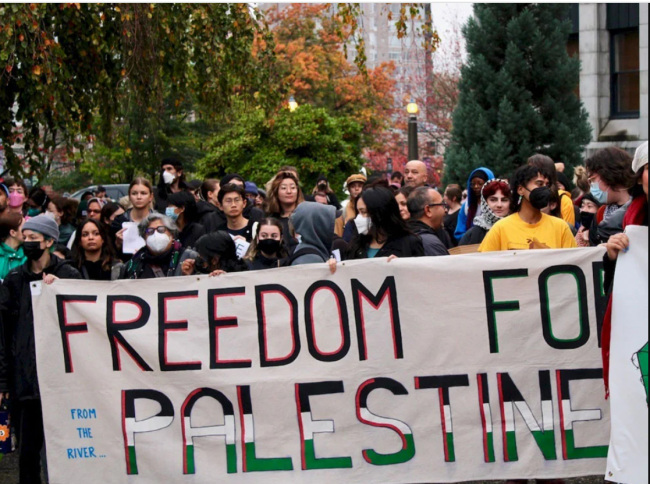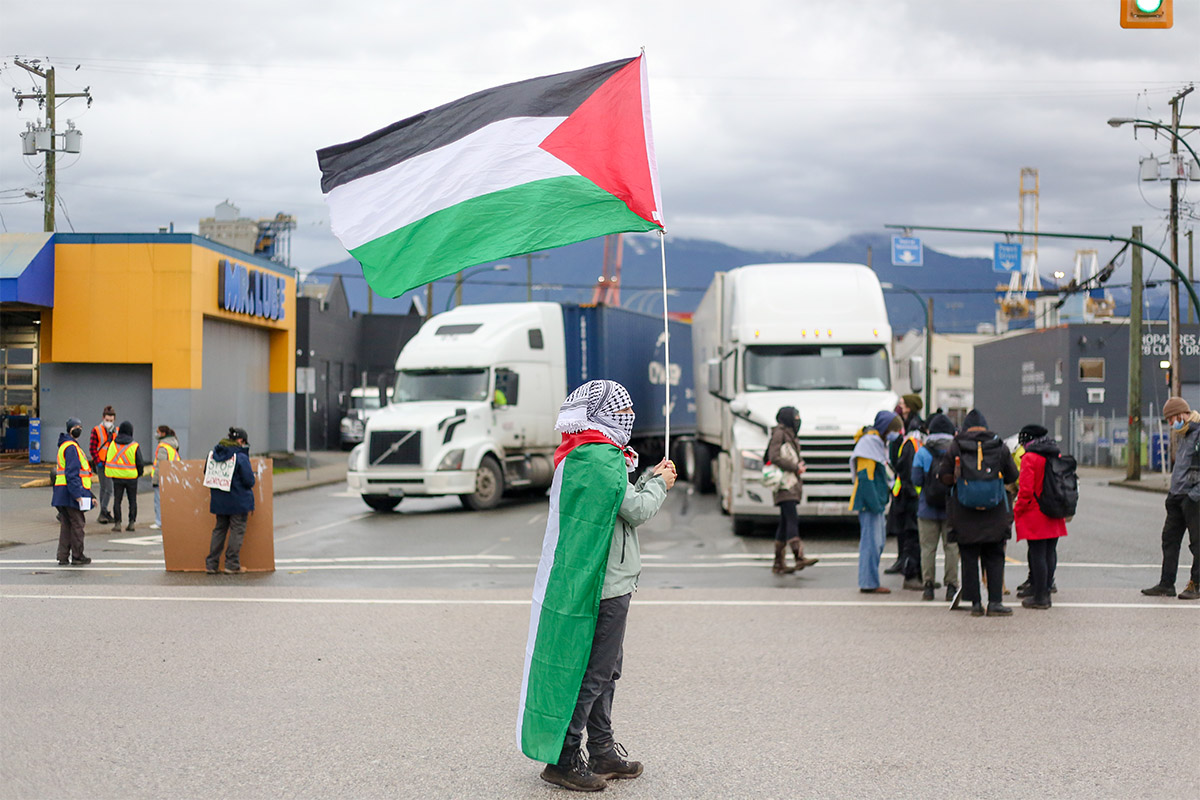Articles Menu

Feb. 2, 2024
The RCMP sent a controversial policing unit, which was originally formed to respond to clashes over resource extraction, to events protesting Israel’s war on Gaza, framing the demonstrations as “pro-Hamas” and supportive of terrorism.
The force said the move reflects an expanded mandate for the Community-Industry Response Group, or C-IRG, a unit currently under systemic investigation by Canada’s police oversight body over widespread allegations of misconduct.
C-IRG’s approach to public disorder has been adopted as a “national best practice,” according to senior media relations officer Staff Sgt. Kris Clark, and a rebrand is underway to reflect its expanded role in B.C.
“While originally created to respond to gas and pipeline involved protests, the C-IRG has been deployed to logging protests, homelessness protests [and] has overseen anti-COVID mandate demonstrations,” Clark said. It has also been dispatched to natural disasters, like floods and wildfires, he added.
The RCMP identified these rallies as happening “in nearly every major centre in the Lower Mainland, Vancouver Island and the Interior” but would not provide the exact dates or locations of the rallies at which C-IRG officers had been present.
Demonstrations began across Canada and around the world following the Oct. 7 attack by the militant group Hamas, which killed about 1,200 people in Israel, and Israel’s ongoing response, which has so far killed more than 27,000 Palestinians in Gaza.
Michael Bueckert, vice-president with the Montreal-based Canadians for Justice and Peace in the Middle East, blasted the RCMP’s response as racist and said he’s not aware of any rallies in Canada supporting Hamas, which the federal government currently lists as a terrorist organization.
“The RCMP is making an outrageous, racist and inflammatory conflation by labelling pro-Palestinian demonstrations as ‘pro-Hamas,’” Bueckert said in a statement to The Tyee, calling it “completely unfair and slanderous” to align those calling for an end to Israel’s war on Gaza with terrorism.
“This is classic anti-Palestinian racism. It is particularly concerning that they refuse to specify which rallies they are referring to, suggesting that they see all pro-Palestinian events in this light,” he said.
Bueckert added that aligning demonstrations with terrorism could have a chilling effect on the personal safety of protesters and the right to peaceful assembly.
The RCMP’s framing echoes comments made by some politicians. On Oct. 9, Toronto Mayor Olivia Chow condemned what she described as “a rally to support Hamas,” saying it glorified violence. The same day, Vancouver Mayor Ken Sim released a statement saying the rallies “celebrate these attacks and the terror group... Hamas.” He called on protesters to “overcome hatred.”
The International Court of Justice is now considering an application by South Africa that accuses Israel of “genocidal acts” against Palestinians. While the ICJ delivered an interim ruling on Jan. 26 that found the claims “plausible,” it stopped short of ordering a ceasefire.
The United Nations says 70 per cent of those killed in Gaza have been women and children, and advocacy groups have drawn attention to the unprecedented number of journalists and aid workers killed in the conflict.
Protests against Israel’s bombardment and siege on Gaza have been ongoing since October.
On Thursday, more than 100 demonstrators blocked the Port of Vancouver at two entrances, demanding an arms embargo against Israel. The blockade follows reports that Canada’s continued military exports to Israel could have potential legal implications following the ICJ ruling.

The Canada Palestine Association is part of a coalition that has organized weekly actions. In a statement, CPA chair Hanna Kawas described the RCMP’s framing of these actions as an attempt to smear the “broad-based and diverse” rallies supporting Palestine, which have included members of the Jewish community.
“It is not surprising that C-IRG are now sending their unit to pro-Palestine events. Their abhorrent behaviour towards our Indigenous brothers and sisters has demonstrated their lack of respect for all Indigenous people,” Kawas said.
C-IRG was formed in 2017 and is known for enforcing the Coastal GasLink pipeline injunction on Wet’suwet’en territory, as well as making more than 1,100 arrests at the Fairy Creek old-growth logging protests on Vancouver Island.
It was created following Sioux-led anti-pipeline demonstrations at the Standing Rock reserve in the Unites States in 2016, with police fearing a similar response to the expansion of the Trans Mountain pipeline in B.C., according to documents obtained by the CBC.
The RCMP faces multiple lawsuits related to C-IRG’s conduct, including from Wet’suwet’en members, a journalist arrested while covering the Coastal GasLink conflict and Fairy Creek protesters, who have proposed a class action.
The B.C. Supreme Court is currently considering an application by three Indigenous land defenders to dismiss criminal charges laid following their arrests on Wet’suwet’en territory in November 2021. The court recently heard that officers used “lethal overwatch” — snipers — and considered using tear gas and sending police dogs into a tiny house on a pipeline work site in order to force people out.
Following these November 2021 arrests, C-IRG officers were recorded making derogatory comments about symbols meant to honour and remember missing and murdered Indigenous women and girls, and laughing about beating a land defender.
A Civilian Review and Complaints Commission investigation was launched last year after the police watchdog received nearly 500 formal complaints about the unit. In November, the CRCC said the investigation had experienced “significant delays” in receiving relevant materials from the RCMP.
Calls to disband C-IRG have come from the BC Civil Liberties Association and the Union of BC Indian Chiefs. The UN Committee on the Elimination of Racial Discrimination has written several letters to Canada expressing concern about the unit’s practices.
Since its inception, C-IRG has cost the force roughly $65 million. Over $40 million was spent policing Coastal GasLink’s injunction on Wet’suwet’en territory, including an additional $3.6 million spent between April and December last year.
The newly released figures show that, during the same time period, C-IRG also spent $10,000 policing the Trans Mountain pipeline, $240,000 at Fairy Creek and $12,000 on an item labelled simply “convoy.”
A new line item called “Hamas Day of Action — October 2023” accrued nearly $11,000 in expenses. The majority of that went to personnel costs while about $500 was spent on “professional and special services,” according to the RCMP’s accounting.
These figures do not include salaries and indirect costs, which are calculated at fiscal year-end on March 31, the records indicate.
Despite mounting criticisms against C-IRG, B.C. quietly allocated stable funding in last year’s budget to make the unit a permanent part of the RCMP.
In November 2022, the province earmarked $36 million for C-IRG as part of a greater investment into rural policing. The amount, to be administered over three years, was designated for “police response to unlawful protests” and court-ordered injunctions, according to internal documents obtained by The Tyee.
In a statement, B.C.’s Ministry of Public Safety and Solicitor General said the funds would “standardize C-IRG within the BC RCMP, support deployment operations and response requirements, and put in place permanent funding for dedicated officers.” C-IRG’s first permanent officers were hired the same month.
C-IRG’s expansion comes with a new name, according to Staff Sgt. Clark. The unit is currently undergoing a rebrand and will be referred to as the Critical Response Unit — British Columbia, or CRU-BC, moving forward.
Clark said the changes are still underway and are not yet reflected on the RCMP’s website. He declined to provide an updated mandate but said that while C-IRG members were previously deployed to both critical incidents and public order events, the name did not reflect the totality of the work they did.
CRU-BC has also absorbed the RCMP’s Police Liaison Team, previously the Division Liaison Team, and will “continue to engage stakeholders at all levels” during critical incidents, he added.
“C-IRG used a measured approach in facilitating the peaceful resolution of public disorder issues,” Clark wrote. “CRU-BC will assist in civil and public order events for natural or human-caused disasters, conduct proactive engagement and, if required, enforcement duties specific to the critical incident.”
Shiri Pasternak, an associate professor of criminology at Toronto Metropolitan University and a member of the National RCMP Research Council, said it is concerning that the unit continues to operate despite the fact that it is under investigation by the CRCC. Pasternak called on the RCMP to make CRU-BC’s new mandate public.
She said the RCMP’s conflation of support for Palestinians with support for terrorism follows a pattern that dates back to 9/11 and the United States’ subsequent Global War on Terror, which saw increased racial profiling in Canada against Muslim, Arab and other racialized groups.
“It is extremely concerning to see a unit that has been so disgraced in terms of their racism, misogyny and violence toward Indigenous people and climate activists now being deployed against people protesting against the genocide ongoing in the Gaza Strip,” she said.
“If this is national best practice, Canada has to take a good hard look at itself.”
Amanda Follett Hosgood is The Tyee’s northern B.C. reporter. She lives in Wet’suwet’en territory.
[Top photo: People gather at an October 2023 Vancouver rally in support of Palestinians in Gaza. The RCMP has confirmed it sent a controversial policing unit to rallies in cities across southern BC, but wouldn’t confirm specific dates or locations. Photo by Jen St. Denis.]